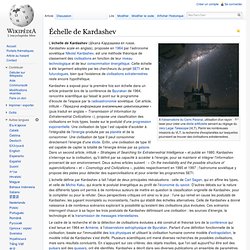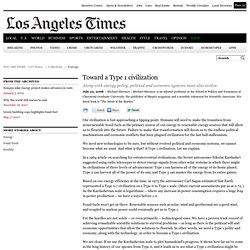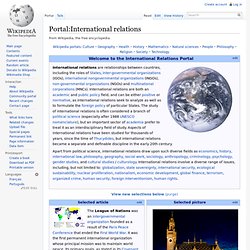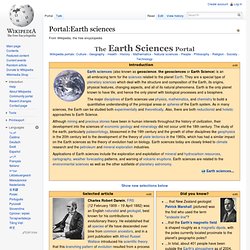

Category:Sociocultural evolution. Category:Sociocultural globalization. Category:Books about globalization. Michio Kaku 3 types of Civilizations. CIVILISATION DE TYPE III !!! Kardashev scale civilizations, type 0,1,2,3 civilizations and beyond. Earth OS. Échelle de Kardashev. Un article de Wikipédia, l'encyclopédie libre.

L'échelle de Kardashev (Шкала Кардашева en russe, Kardashev scale en anglais), proposée en par l'astronome soviétique Nikolaï Kardashev, est une méthode théorique de classement des civilisations en fonction de leur niveau technologique et de leur consommation énergétique. Cette échelle a été largement adoptée par les chercheurs du projet SETI et les futurologues, bien que l'existence de civilisations extraterrestres reste encore hypothétique. Kardashev a exposé pour la première fois son échelle dans un article présenté lors de la conférence de Byurakan de 1964, rencontre scientifique qui faisait le point sur le programme d'écoute de l'espace par la radioastronomie soviétique. L'échelle définie par Kardashev a fait l'objet de deux principales réévaluations : celle de Carl Sagan, qui en affine les types, et celle de Michio Kaku, qui écarte le postulat énergétique au profit de l'économie du savoir.
Someday, after mastering the winds, the waves, the tides and gravity, we shall harness for God the energies of love,... PLANETARY. Toward a Type 1 civilization. Our civilization is fast approaching a tipping point.

Humans will need to make the transition from nonrenewable fossil fuels as the primary source of our energy to renewable energy sources that will allow us to flourish into the future. Failure to make that transformation will doom us to the endless political machinations and economic conflicts that have plagued civilization for the last half-millennium. We need new technologies to be sure, but without evolved political and economic systems, we cannot become what we must. And what is that? A Type 1 civilization. In a 1964 article on searching for extraterrestrial civilizations, the Soviet astronomer Nikolai Kardashev suggested using radio telescopes to detect energy signals from other solar systems in which there might be civilizations of three levels of advancement: Type 1 can harness all of the energy of its home planet; Type 2 can harvest all of the power of its sun; and Type 3 can master the energy from its entire galaxy.
PLANETARY [Trailer] Portal:Globalization. Category:Globalization-related indices. Category:Globalization terminology. Portal:Sustainable development. Portal:Ecology.
Portal:International relations. From Wikipedia, the free encyclopedia Welcome to the International Relations Portal Apart from political science, international relations draw upon such diverse fields as economics, history, international law, philosophy, geography, social work, sociology, anthropology, criminology, psychology, gender studies, and cultural studies / culturology.

International relations involve a diverse range of issues, including, but not limited to: globalization, state sovereignty, international security, ecological sustainability, nuclear proliferation, nationalism, economic development, global finance, terrorism, organized crime, human security, foreign interventionism, human rights. The League of Nations was an intergovernmental organization founded as a result of the Paris Peace Conference that ended the First World War.
It was the first permanent international organization whose principal mission was to maintain world peace. –When a task is completed, please remove it from the list. Portal:Earth sciences. The Earth Sciences Portal The major disciplines of Earth sciences use physics, mathematics, and chemistry to build a quantitative understanding of the principal areas or spheres of the Earth system.

As in many sciences, the Earth can be studied both experimentally and theoretically. Also, there are both reductionist and holistic approaches to Earth Science. Although mining and precious stones have been in human interests throughout the history of civilization, their development into the sciences of economic geology and mineralogy did not occur until the 18th century. The study of the earth, particularly palaeontology, blossomed in the 19th century and the growth of other disciplines like geophysics in the 20th century led to the development of the theory of plate tectonics in the 1960s, which has had a similar impact on the Earth sciences as the theory of evolution had on biology. Edit an Earth sciences article Join one of the WikiProjects listed below.